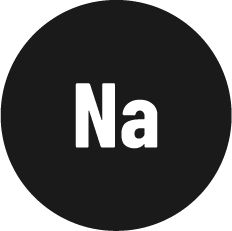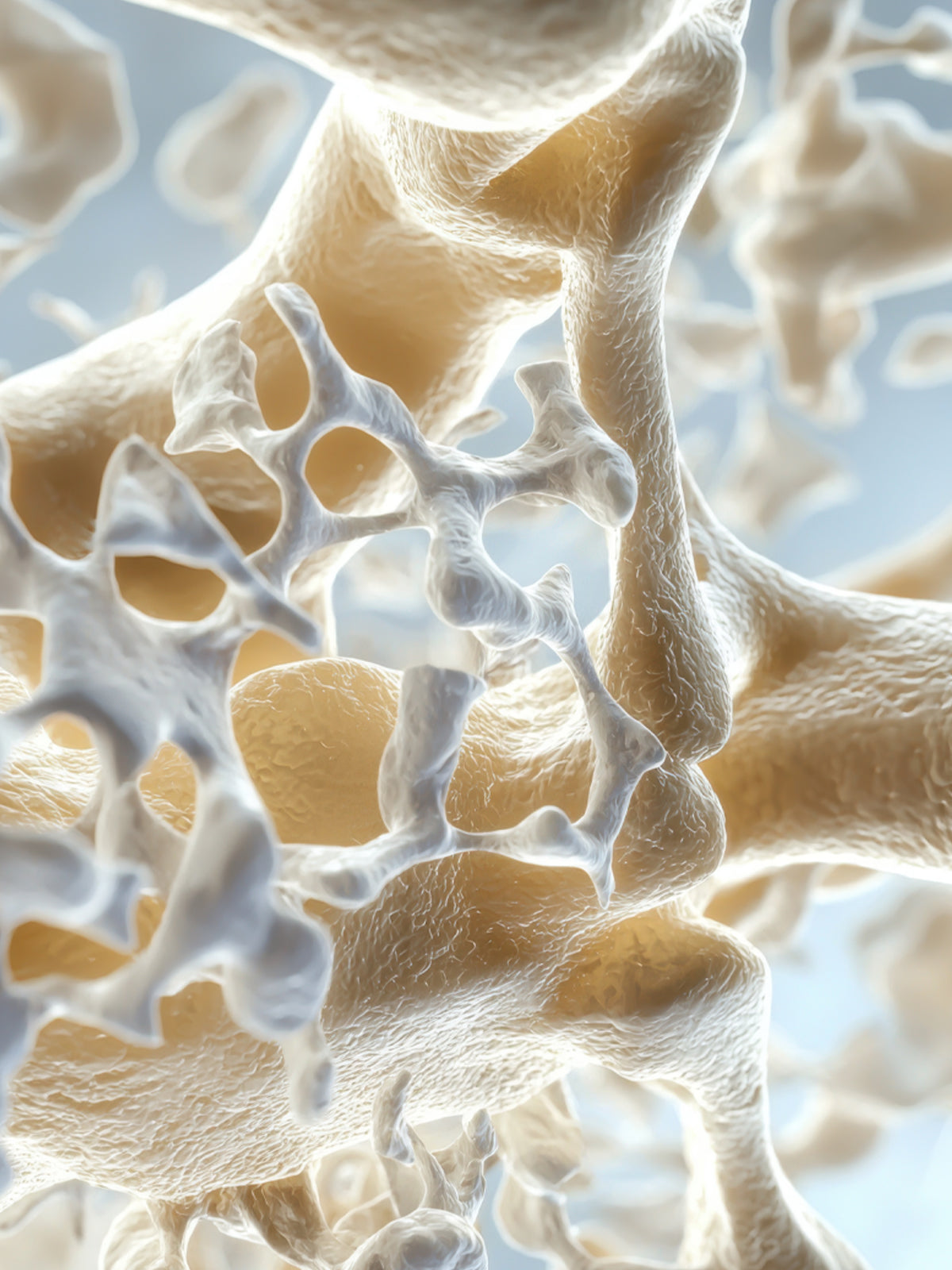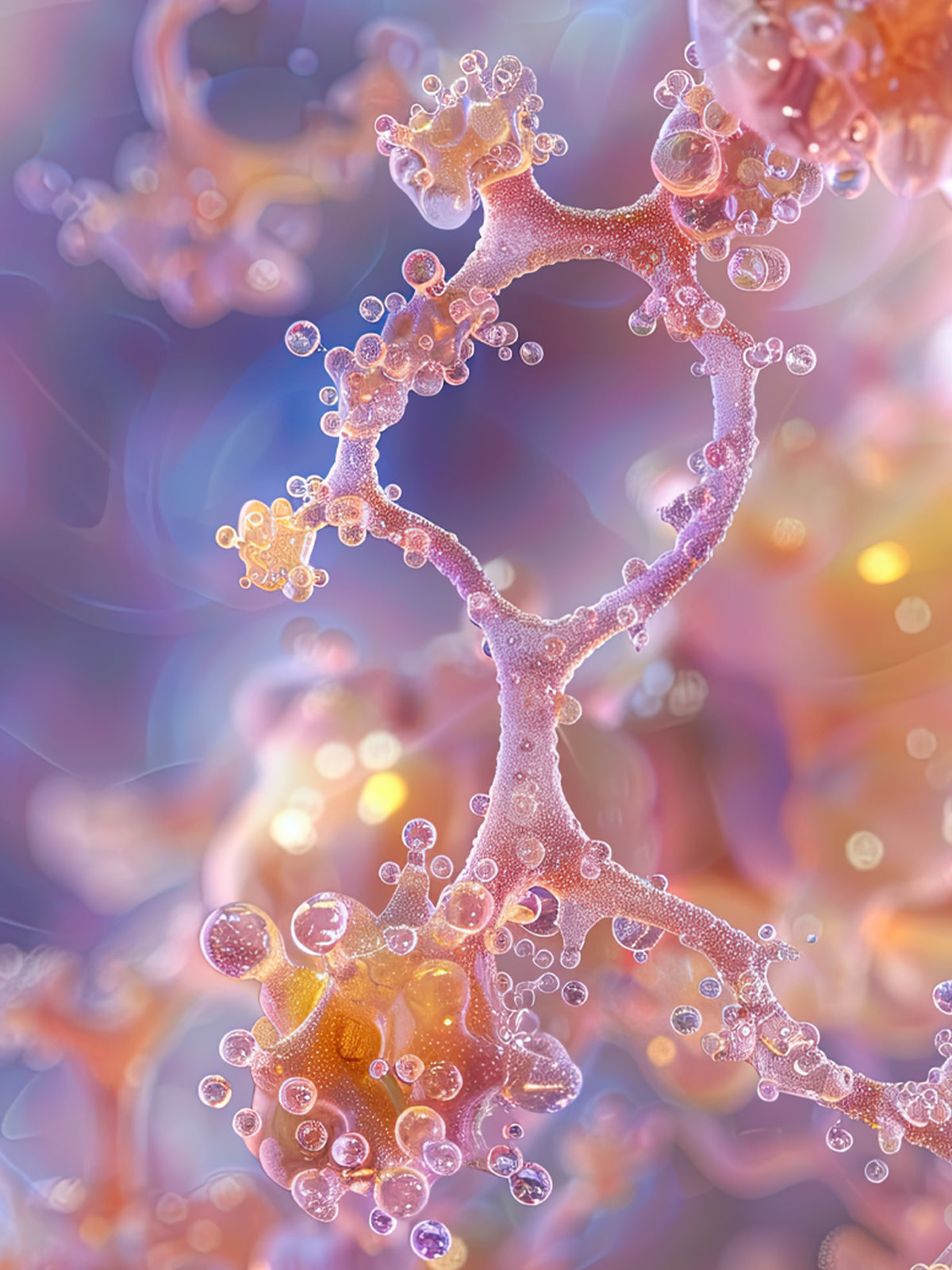INGREDIENTS INSIGHTS
Explore the science and benefits behind every ingredient we use.


Magnesium is a vital mineral that plays a crucial role in numerous bodily functions, serving as an essential cofactor for over 300 enzymatic reactions within the body. One of its most important roles is in maintaining proper hydration levels, as magnesium helps regulate fluid balance by controlling the movement of electrolytes across cell membranes. This regulation ensures that cells remain adequately hydrated, which is essential for optimal muscle function and overall health.
Magnesium Malate, a highly bioavailable form of magnesium combined with malic acid, offers enhanced absorption and effectiveness. This combination not only supports electrolyte balance but also aids in boosting energy levels by participating in the Krebs cycle—a process that converts food into energy. Athletes and physically active individuals may find Magnesium Malate particularly beneficial, as it enhances exercise performance by reducing fatigue and muscle soreness.


Sodium Chloride, more commonly known as salt, is an essential mineral that plays a pivotal role in maintaining the body's fluid and electrolyte balance. This balance is critical for proper hydration, ensuring that fluids are distributed effectively throughout the body's cells, tissues, and organs. Without adequate sodium chloride, the body struggles to regulate its water content, leading to potential dehydration and impaired cellular function.
As a key electrolyte, sodium chloride works in harmony with other electrolytes like potassium and magnesium to support vital physiological processes. It helps maintain blood pressure, supports nerve impulses, and facilitates muscle contractions. By ensuring that fluids are evenly distributed, sodium chloride contributes to the optimal functioning of the cardiovascular and nervous systems.

Magnesium is a vital mineral that plays a crucial role in numerous bodily functions, serving as an essential cofactor for over 300 enzymatic reactions within the body. One of its most important roles is in maintaining proper hydration levels, as magnesium helps regulate fluid balance by controlling the movement of electrolytes across cell membranes. This regulation ensures that cells remain adequately hydrated, which is essential for optimal muscle function and overall health.
Magnesium Malate, a highly bioavailable form of magnesium combined with malic acid, offers enhanced absorption and effectiveness. This combination not only supports electrolyte balance but also aids in boosting energy levels by participating in the Krebs cycle—a process that converts food into energy. Athletes and physically active individuals may find Magnesium Malate particularly beneficial, as it enhances exercise performance by reducing fatigue and muscle soreness.

Sodium Chloride, more commonly known as salt, is an essential mineral that plays a pivotal role in maintaining the body's fluid and electrolyte balance. This balance is critical for proper hydration, ensuring that fluids are distributed effectively throughout the body's cells, tissues, and organs. Without adequate sodium chloride, the body struggles to regulate its water content, leading to potential dehydration and impaired cellular function.
As a key electrolyte, sodium chloride works in harmony with other electrolytes like potassium and magnesium to support vital physiological processes. It helps maintain blood pressure, supports nerve impulses, and facilitates muscle contractions. By ensuring that fluids are evenly distributed, sodium chloride contributes to the optimal functioning of the cardiovascular and nervous systems.




Potassium is a critical electrolyte that plays a central role in maintaining cellular function and overall electrolyte balance in the body. Working closely with sodium, potassium ensures that cells maintain their proper electrical charge, which is vital for the efficient functioning of muscles, nerves, and the cardiovascular system. Without sufficient potassium, cellular processes can become disrupted, leading to a range of health concerns.
One of potassium's most important functions is its support of the nervous system. It helps regulate the transmission of nerve impulses, which are necessary for smooth and controlled muscle movements. This regulation is especially crucial for heart health, as potassium assists in maintaining a steady heartbeat and preventing irregular heart rhythms. By supporting both muscle and heart contractions, potassium is indispensable for sustaining life and ensuring peak physical performance.
Potassium also contributes to hydration by working alongside sodium to regulate fluid balance. It helps move fluids into and out of cells, preventing dehydration and ensuring that cells remain nourished and functional. For athletes or individuals engaging in strenuous activities, maintaining potassium levels is particularly important, as sweating can deplete this vital electrolyte and increase the risk of cramps, fatigue, and poor performance.


Calcium is an essential electrolyte that serves as a cornerstone for many of the body's critical functions. Best known for its role in building and maintaining strong bones and teeth, calcium is also vital for numerous other physiological processes that sustain life and overall health. Approximately 99% of the body's calcium is stored in bones, acting as a reserve to maintain adequate levels in the bloodstream when dietary intake is insufficient.
Beyond its contribution to bone health, calcium plays a crucial role in muscle function. It facilitates muscle contractions, including those of the heart, by enabling the interaction between actin and myosin, the proteins responsible for muscle movement. This makes calcium indispensable not only for everyday activities but also for physical performance and recovery. Without adequate calcium, muscles may weaken, and the risk of cramps, spasms, or irregular heart rhythms increases.
Calcium also supports nerve transmission by helping transmit signals between nerves and muscles, ensuring the smooth communication necessary for coordinated movement and reflexes. Its role extends to the circulatory system, where it is involved in blood clotting—a critical function that prevents excessive bleeding during injuries by activating clot-forming proteins.

Potassium is a critical electrolyte that plays a central role in maintaining cellular function and overall electrolyte balance in the body. Working closely with sodium, potassium ensures that cells maintain their proper electrical charge, which is vital for the efficient functioning of muscles, nerves, and the cardiovascular system. Without sufficient potassium, cellular processes can become disrupted, leading to a range of health concerns.
One of potassium's most important functions is its support of the nervous system. It helps regulate the transmission of nerve impulses, which are necessary for smooth and controlled muscle movements. This regulation is especially crucial for heart health, as potassium assists in maintaining a steady heartbeat and preventing irregular heart rhythms. By supporting both muscle and heart contractions, potassium is indispensable for sustaining life and ensuring peak physical performance.
Potassium also contributes to hydration by working alongside sodium to regulate fluid balance. It helps move fluids into and out of cells, preventing dehydration and ensuring that cells remain nourished and functional. For athletes or individuals engaging in strenuous activities, maintaining potassium levels is particularly important, as sweating can deplete this vital electrolyte and increase the risk of cramps, fatigue, and poor performance.

Calcium is an essential electrolyte that serves as a cornerstone for many of the body's critical functions. Best known for its role in building and maintaining strong bones and teeth, calcium is also vital for numerous other physiological processes that sustain life and overall health. Approximately 99% of the body's calcium is stored in bones, acting as a reserve to maintain adequate levels in the bloodstream when dietary intake is insufficient.
Beyond its contribution to bone health, calcium plays a crucial role in muscle function. It facilitates muscle contractions, including those of the heart, by enabling the interaction between actin and myosin, the proteins responsible for muscle movement. This makes calcium indispensable not only for everyday activities but also for physical performance and recovery. Without adequate calcium, muscles may weaken, and the risk of cramps, spasms, or irregular heart rhythms increases.
Calcium also supports nerve transmission by helping transmit signals between nerves and muscles, ensuring the smooth communication necessary for coordinated movement and reflexes. Its role extends to the circulatory system, where it is involved in blood clotting—a critical function that prevents excessive bleeding during injuries by activating clot-forming proteins.




Vitamin B12 is an essential nutrient that plays a pivotal role in maintaining overall health by supporting a wide range of bodily functions. One of its most critical responsibilities is aiding in the formation of red blood cells, which are necessary for delivering oxygen throughout the body. A deficiency in Vitamin B12 can lead to anaemia, resulting in fatigue, weakness, and impaired physical performance.
Another vital function of Vitamin B12 is its contribution to nerve health. It is essential for the production of myelin, the protective sheath around nerves that ensures efficient signal transmission. This makes B12 crucial for maintaining a healthy nervous system, reducing the risk of neurological issues, and supporting coordination and reflexes.
Vitamin B12 is also a key player in energy production. It helps convert food into usable energy by participating in the metabolism of fats, proteins, and carbohydrates. Individuals with adequate B12 levels often experience improved energy and reduced fatigue, making it a valuable nutrient for those with demanding lifestyles.


Vitamin C is a powerful antioxidant that plays an essential role in maintaining overall health and optimising physical performance. As a key immune system enhancer, Vitamin C helps protect the body against infections, reduce inflammation, and support recovery from illnesses or intense physical activity. Its antioxidant properties neutralise harmful free radicals, reducing oxidative stress and supporting cellular health.
One of Vitamin C’s notable benefits is its ability to work synergistically with other nutrients like Vitamin B12 and Magnesium. Together, these nutrients contribute to enhanced energy production, improved exercise performance, and better overall metabolic function. By supporting the synthesis of carnitine, Vitamin C helps the body convert fats into energy, making it particularly valuable for athletes and those with active lifestyles.
Vitamin C also plays a significant role in regulating blood sugar levels. It enhances insulin sensitivity and reduces inflammation, which can benefit individuals with blood sugar imbalances or those looking to maintain stable energy levels during the day. When paired with Magnesium, Vitamin C supports a balanced electrolyte profile, further aiding hydration and muscle function.

Vitamin B12 is an essential nutrient that plays a pivotal role in maintaining overall health by supporting a wide range of bodily functions. One of its most critical responsibilities is aiding in the formation of red blood cells, which are necessary for delivering oxygen throughout the body. A deficiency in Vitamin B12 can lead to anaemia, resulting in fatigue, weakness, and impaired physical performance.
Another vital function of Vitamin B12 is its contribution to nerve health. It is essential for the production of myelin, the protective sheath around nerves that ensures efficient signal transmission. This makes B12 crucial for maintaining a healthy nervous system, reducing the risk of neurological issues, and supporting coordination and reflexes.
Vitamin B12 is also a key player in energy production. It helps convert food into usable energy by participating in the metabolism of fats, proteins, and carbohydrates. Individuals with adequate B12 levels often experience improved energy and reduced fatigue, making it a valuable nutrient for those with demanding lifestyles.

Vitamin C is a powerful antioxidant that plays an essential role in maintaining overall health and optimising physical performance. As a key immune system enhancer, Vitamin C helps protect the body against infections, reduce inflammation, and support recovery from illnesses or intense physical activity. Its antioxidant properties neutralise harmful free radicals, reducing oxidative stress and supporting cellular health.
One of Vitamin C’s notable benefits is its ability to work synergistically with other nutrients like Vitamin B12 and Magnesium. Together, these nutrients contribute to enhanced energy production, improved exercise performance, and better overall metabolic function. By supporting the synthesis of carnitine, Vitamin C helps the body convert fats into energy, making it particularly valuable for athletes and those with active lifestyles.
Vitamin C also plays a significant role in regulating blood sugar levels. It enhances insulin sensitivity and reduces inflammation, which can benefit individuals with blood sugar imbalances or those looking to maintain stable energy levels during the day. When paired with Magnesium, Vitamin C supports a balanced electrolyte profile, further aiding hydration and muscle function.







